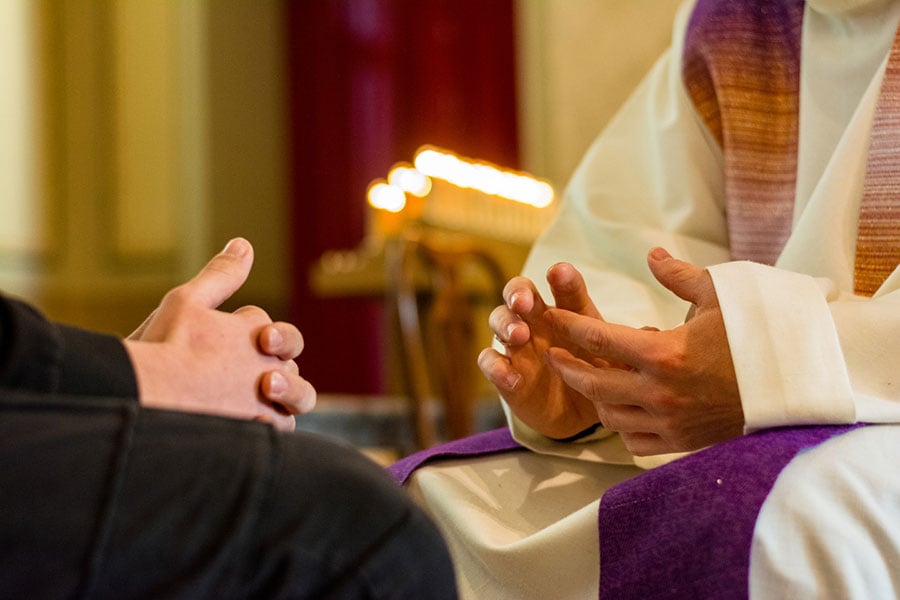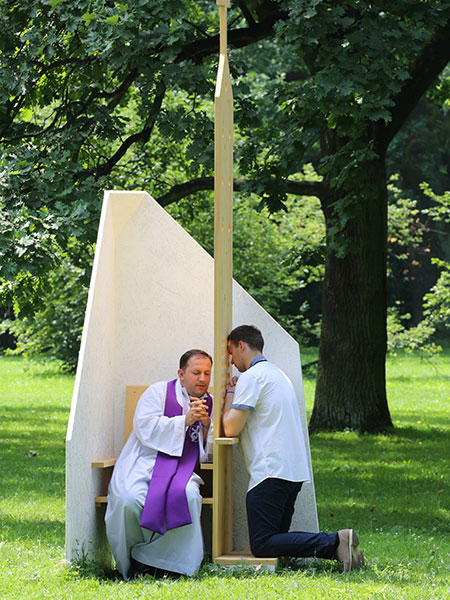Confession: a great opportunity to get right with God

Vytautas Markūnas SDB / Cathopic.com
(OSV News) — When Dr. Bernard Nathanson died of cancer in February 2011, the obituary writers dutifully recorded that he’d become a Catholic back in 1996. Some even recalled the reason he gave for taking that step.
In the 1960s and 1970s, Nathanson, a New York OB-GYN, had been a national leader in the campaign to legalize abortion. Then he saw the light, turned against abortion, and became a pro-life crusader. Joining the Catholic Church was another stage in his conversion process.
But why become a Catholic? Because, Nathanson explained, the Catholic Church has the best developed system for seeking and receiving God’s forgiveness. And as someone who’d performed 5,000 abortions himself and shared responsibility for many thousands more, he had much need to be forgiven.
Following conscience
It’s a moving story. But most of us aren’t sinners on that scale and so, we may reason, perhaps we don’t have as much cause as Nathanson to worry about sin and forgiveness.
Tempting as it may sometimes be to think like that, it clashes head-on with the first epistle of St. John: “If we say, ‘We have no sin,’ we deceive ourselves, and the truth is not in us. If we acknowledge our sins, he [God] is faithful and just and will forgive our sins and cleanse us from all unrighteousness. If we say, ‘We have not sinned,’ we make him a liar, and his word is not in us” (1 Jn 1:8-10).
Today powerful forces in the surrounding culture encourage people to ignore or downplay their sins and, if they’re Catholics, to skip the Sacrament of Penance. Confused ideas about conscience often have much to do with that. “I do what my conscience tells me,” people say, “and that’s good enough.”
People said the same thing in St. John Henry Newman’s time. But the distinguished English convert sharply criticized the idea of conscience that implied. Calling it a “counterfeit” of genuine conscience, St. Newman wrote in 1875:
“When men advocate the rights of conscience, they in no sense mean the rights of the creator nor the duty to him … They demand what they think is an Englishman’s prerogative, for each to be his own master in all things and to profess what he pleases, asking no one’s leave and accounting priest or preacher, speaker or writer unutterably impertinent who dare to say a word against his going to perdition … in his own way.”
Risky business, you might think. Especially in view of a point made by another British convert-author, Msgr. Robert Hugh Benson, concerning serious sins we may culpably ignore: “We need … the pardon that descends when we are unaware that we must have it or die. … Only God, who knows all things, can forgive us effectively.”
Dramatic drop-off
Some years ago, a much-discussed book by the social critic Christopher Lasch argued that our society is dominated by a “culture of narcissism.” The label seemed to fit. Narcissists, though notorious for self-absorption, steer clear of self-examination in any meaningful sense. This makes narcissism the deadly enemy of contrition and confession, considered as elements of a virtuous life.
Whether you accept or reject Lasch’s social analysis, the numbers leave no doubt that a serious problem does exist these days where penance is concerned. To such an extent, in fact, that it’s often said to be a sacrament in crisis.
There is a crisis here all right, but it isn’t really with the sacrament — it’s with the people who need it but ignore it.
In one recent survey, only about 40 percent of those identifying themselves as Catholics said they received penance — went to confession — at least once a year. Nearly 30 percent said they never go.
The problem isn’t new. Sacramental confession has been in steep decline for years.
In the 1950s and 1960s, about 80 percent of America’s Catholics went to confession at least once a year. A study in the early 1960s found that 70 percent had been to confession in the previous month. But by 1986, confession in the previous month had fallen to 23 percent. Among Catholics aged 18-30, it was 14 percent.
Down and down. By 2005, fewer than half the Catholics reported confessing their sins as often as once a year.
Rationalizing sin
What accounts for the dramatic falling-off? One highly credible theory holds that it’s related to the rise of contraception among Catholics. I sometimes call this the “elephant in the living room” explanation — everybody knows it’s there, but few care to acknowledge the fact.

About 89 percent of American Catholics now say that contraception is not morally wrong, despite the Church’s teaching that it is wrong. Believing — or saying they believe — that contraception is all right, these people resist confessing it. But knowing the Church says differently, they don’t want to go to confession and not confess it. For many, it appears, the non-solution to their dilemma is to stay away from the sacrament entirely.
Often, though, a sense of guilt remains. And then? Then things get peculiar. Rationalization and denial set in. There may be other false moves. In the 2000s, somebody launched an internet confession site (I don’t know if it’s still there). Web surfers could “confess” their sins by typing them in, then make them disappear — “lost” in cyberspace, I guess — by clicking the mouse.
Perhaps that made a few people feel better, but I doubt it helped many. Like rationalizing sin, clicking sins away is a lazy and ineffectual way of evading truth. Whereas honestly confessing sins to a priest in the Sacrament of Penance requires facing up to their reality, feeling honest sorrow, and resolving not to commit them again.
Even so, people often insist that confessing sins isn’t necessary. God can forgive sins without that, and if you’re sorry in your heart, that’s enough.
Glorious opportunity
It’s true that God can and does forgive sins apart from the Sacrament of Penance. But the case for the sacrament rests upon the simple fact that Jesus Christ instituted it as the normal, natural means for his followers to use in seeking forgiveness for sin. And if that’s what Jesus intended, no Catholic with even a superficial education in the Faith is entitled to turn his or her back on penance.
Quite possibly, though, the best way of selling the idea of confessing sins and being forgiven to people who have abandoned the sacrament is to present this as an opportunity rather than just an obligation. Indeed, a great and glorious opportunity it most surely is.
Consider first of all what any sacrament fundamentally is — in the words of the Baltimore Catechism, it is an “outward sign instituted by Christ to give grace.” Yes, God could, and sometimes does, deal with human beings in other ways, meeting them on a purely spiritual level. In the sacraments, however, God generously chooses to deal with us just as we are — human persons, composed of body and soul, who live in community with others in a concrete, tangible world. A kind of divine realism can be seen at work in the sacramental system.
As far as penance is concerned, all that is true — and something more besides. Along with the Eucharist, this is one of the sacraments in which the priest acts in persona Christi — in the person of Christ. What the priest does is secondary; the primary action is the action of Christ, which the priest performs on Christ’s behalf as his proxy. It is Christ above all who is present and acting in penance, and Christ who tells repentant sinners, “I absolve you.”
Obviously, though, Jesus isn’t physically present, saying “I absolve you” in his own voice. Instead, we have the sacrament — Jesus present and acting through the priest. It’s no great stretch to call this another kind of “real presence” of Christ, different from his presence in the Eucharist, yet also astonishingly real.
Considered this way, the opportunity to confess sins to a priest in penance and have them forgiven by Christ is an extraordinary privilege. The Catechism of the Catholic Church says this sacrament of reconciliation with God “brings about a true ‘spiritual resurrection’” (No. 1468).
If more Catholics understood that, we might again start seeing penitents lined up outside confessionals waiting to take advantage of this extraordinary opportunity to receive God’s merciful pardon.
by Russell Shaw, the author of American Church, The Life of Jesus Christ, and other books.
